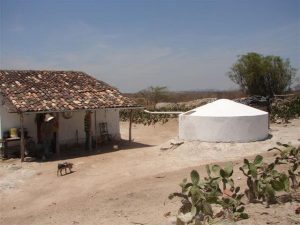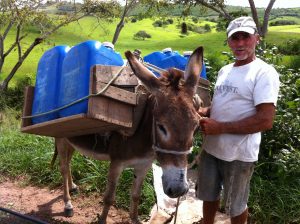
(versão em português https://newsletter.economics.utoronto.ca/construcao-de-cisternas-na-regiao-nordeste-do-brasil-reduz-a-vulnerabilidade-economica-e-melhora-a-democracia/)
Toronto, 14 June, 2023: Improving access to water can improve democracy. That’s one theme in an article published this week on VoxDev by Gustavo Bobonis, Professor of Economics at the University of Toronto and his co-authors.
Bobonis and his team, studied the impact of building residential water cisterns in the semi-arid zone of Northeast Brazil. The 28 million people who inhabit the mostly rural area have disproportionately low-incomes compared to the rest of the country. One source of their vulnerability is the recurring droughts prevalent in the region.
This economic vulnerability exposes the population to a political vulnerability known as clientelism. The concept is simply the exchange of hand-outs in return for political support. Experts consider clientelism to be one of the reasons why democracies often fail to address the concerns of poor and vulnerable populations.
Bobonis and his team argue that economic vulnerability causes citizens to participate in clientelism, with negative consequences for democracies.

In Brazil, local politicians have what the authors describe as “substantial discretion over local public spending.” As a result, people’s access to services is often dependent on political support. Bobonis’ team found that voters in the zone were more likely to declare their support for politicians in public and more likely to ask them for help in private during droughts.
The study’s authors explored whether vulnerability makes voters more likely to participate in clientelist relationships and, if vulnerability is a cause of clientelism, what are the electoral consequences of reducing it?
To investigate, Bobonis and his team conducted a randomized control trial to look at how constructing rainwater cisterns might reduce vulnerability to droughts and impact the prevalence of clientelist relationships with local politicians.
The trial was conducted in partnership with the Brazilian NGO Semi-Arid Articulation (ASA). 615 households received water cisterns while another 693 households formed the comparison group. ASA started constructing the cisterns in January 2012, in advance of Brazil’s 2012 municipal elections that October.
The team conducted two surveys after the cisterns were constructed. One immediately after the October 2012 municipal elections and one a year later.
The result? Access to cisterns did reduce vulnerability to droughts. Access also decreased clientelist relationships and negatively affected the election performance of incumbent mayors who stood for re-election. Those who received water cisterns were significantly less likely to make private requests from politicians. Not only were those with access to rainwater cisterns 17% less likely to make requests from politicians during the election campaign, but also during the year after the election. Requests for hand-outs from citizens who were most likely to be in clientelist relationships before receiving the cisterns fell by 38%.
“Our results suggest that economic vulnerability contributes to clientelism because citizens do not have adequate resources or insurance to protect against risk,” Professor Bobonis said. “Clientelism often helps vulnerable citizens cope with uncertainty and adversity, but even if vulnerabilities are reduced, clientelism may continue. Policies and practices are needed to adequately protect citizens from shocks like droughts, illness, and unemployment.”
The study, “Vulnerability and Clientelism” was published in the American Economic Review. The summary can be found at this link: https://www.aeaweb.org/articles?id=10.1257/aer.20190565&from=f
To read more about ASA, the NGO who built the cisterns, follow this link: https://www.asabrasil.org.br/
Cindy MacDonald wrote about the study for the University of Toronto’s Arts & Sciences News. Her piece is found on this page https://www.artsci.utoronto.ca/news/examining-roots-corruption-international-team-studies-how-and-why-votes-are-bought
The VoxDev article about the study can be found here: https://voxdev.org/topic/institutions-political-economy/reducing-vulnerability-curbing-clientelism-case-study-brazil
Return to the Department of Economics website by clicking here https://economics.utoronto.ca/
To keep reading updates about the department’s community, go back to the newsletter homepage: https://newsletter.economics.utoronto.ca/
